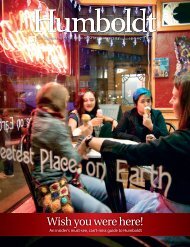Unveiled - Humboldt Magazine - Humboldt State University
Unveiled - Humboldt Magazine - Humboldt State University
Unveiled - Humboldt Magazine - Humboldt State University
You also want an ePaper? Increase the reach of your titles
YUMPU automatically turns print PDFs into web optimized ePapers that Google loves.
© THOMAS JOSHUA COOPER<br />
Thomas Joshua Cooper (‘69), a 2009 Guggenheim Fellowship recipient, traveled to the Arctic Circle to take “Looking towards the Old Lands.”<br />
To the Edge and Back Guggenheim Recipient Documents Extreme Places<br />
IF LLOYD’S OF LONDON, the British company<br />
that famously insured Betty Grable’s<br />
legs for $250,000, won’t touch your boat<br />
because your journey has been deemed<br />
too insanely dangerous, then you know<br />
you’re in for tough times.<br />
For Thomas Joshua Cooper, his photography<br />
work means accepting those<br />
risks and pushing forward to document<br />
some of the world’s most unforgiving locations<br />
along the Atlantic basin. Whether<br />
he travels through forests or deserts, getting<br />
to coastal waters is always difficult,<br />
none as much as his three-month journey<br />
to Antarctica’s Prime Head.<br />
“The weather was astonishingly unforgiving<br />
and also lethally dangerous.<br />
We got there and brought back a wonderful<br />
set of pictures, and when we finally<br />
got back to safety at one of the island<br />
research stations one of the scientists asks<br />
where we’ve been. We tell him and the<br />
guy laughs and says, 'Can you prove it'<br />
My captain was deeply offended; there were<br />
four of us on that boat for three months at<br />
sea, and in that kind of weather it was like<br />
being in solitary confinement. We showed<br />
him the chart path and the guy says you do<br />
realize that more people have stood on the<br />
face of the moon than have stood on Prime<br />
Head Point. It’s that hard to get to.”<br />
For Cooper the work became a lesson<br />
in the brutal reality of Earth’s most<br />
extreme places.<br />
“It’s been an education in humility for<br />
me. I thought foolishly that since they’re<br />
so easy to see in big atlases, it just seemed<br />
so simple. It was just astonishingly difficult<br />
but also deeply rewarding.”<br />
Cooper (’69 Art, Secondary Education)<br />
has been awarded a Guggenheim<br />
Fellowship for his Atlantic basin project,<br />
which takes the photographer to the<br />
“beginnings of civilization” surrounding<br />
the Atlantic Ocean. In addition to being<br />
incredibly hard to get to, the locations<br />
Cooper visits offer him first-hand affirmation<br />
of the effects of climate change.<br />
“The great idea of the permanence of<br />
the north is changing in our time,” says<br />
Cooper. “Despite everyone’s opinion about<br />
it, I’ve been in places that verify that the<br />
Earth is changing and we made it do that.”<br />
During his time at <strong>Humboldt</strong> <strong>State</strong><br />
Cooper studied under Professor Thomas<br />
Knight, who founded the fine art photography<br />
program at HSU in the 1950s.<br />
Cooper credits Knight, along with all the<br />
faculty in the Art Department, with helping<br />
him develop his personal aesthetic.<br />
“The early and founding members of<br />
HSU’s extraordinary Art Department were<br />
all wonderful, exceptional and inspirational<br />
teachers to me. The professors<br />
were profound in their positive effect in<br />
bringing both the requirements for the<br />
craft and the purpose of an artist fully<br />
and clearly into my youthful and not very<br />
experienced life at the time,” says Cooper.<br />
HUMBOLDT STATE UNIVERSITY | humboldt.edu<br />
9




